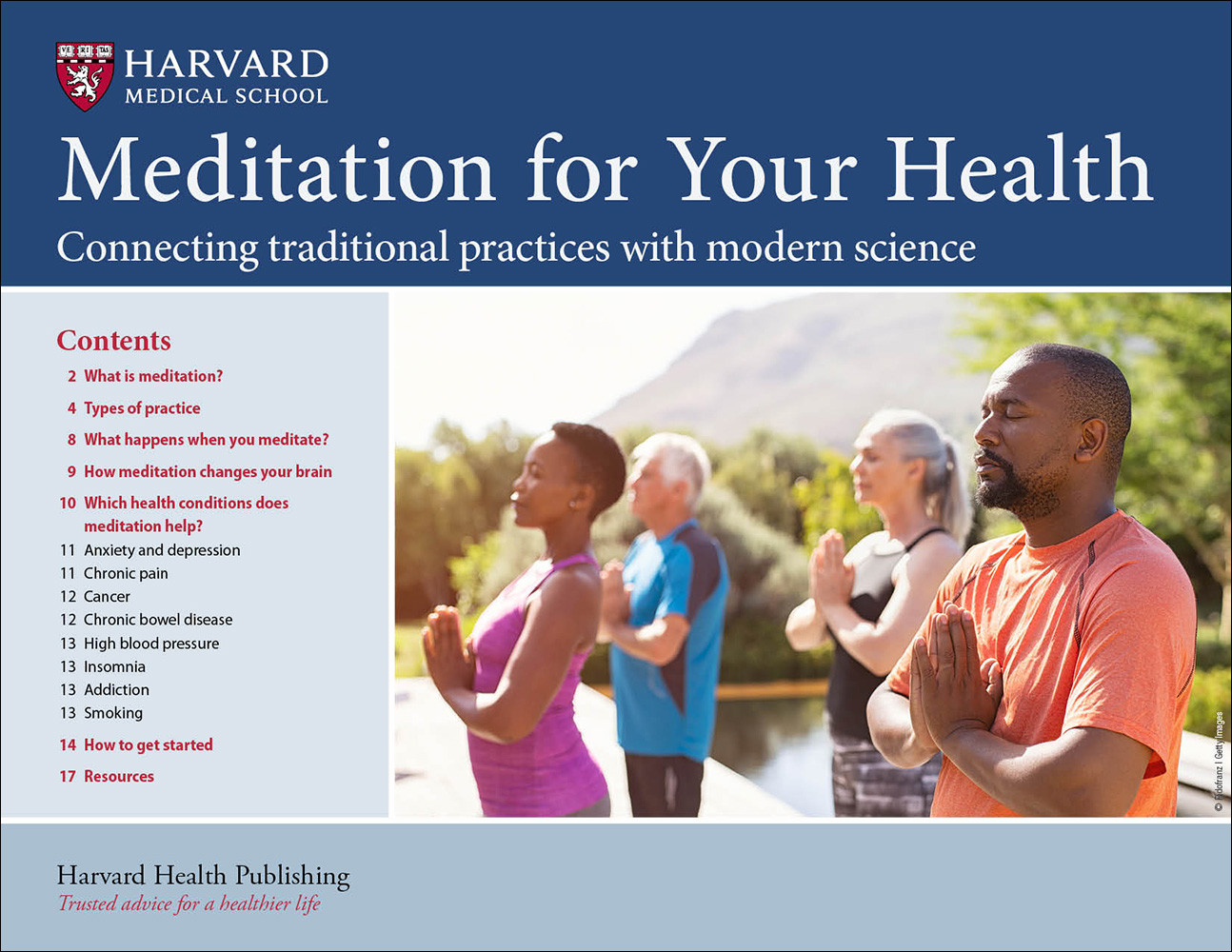Meditation: A heartfelt habit?
Meditation may lower blood pressure and help people make healthier choices when coping with stress.
- Reviewed by Christopher P. Cannon, MD, Editor in Chief, Harvard Heart Letter; Editorial Advisory Board Member, Harvard Health Publishing

Meditating sounds so simple: Just sit comfortably and quiet your mind. Yet even seasoned practitioners will tell you that settling into a meditative state isn't easy, especially when you're anxious, worried, or stressed. But meditation may benefit people prone to cardiovascular disease, so it's worth giving this mind-calming technique a try (see "How meditation may help your heart").
"When you start any new activity, coaching or guidance can really help, and that's also true when learning to meditate," says Dr. Darshan Mehta, medical director of the Benson-Henry Institute for Mind Body Medicine at Harvard-affiliated Massachusetts General Hospital. Many communities have meditation centers where you can take classes in person. But online courses, which are more convenient and accessible, can be just as effective, he says. Another option is to try a smartphone app that offers guided meditations; popular ones include Headspace, Calm, Insight Timer, and 10% Happier.
How meditation may help your heartAn article published Feb. 15, 2024, in Cochrane Database of Systematic Reviews looked at the potential cardiovascular benefits from two forms of meditation: mindfulness-based practices and Transcendental Meditation. The authors analyzed 81 randomized controlled trials involving a total of nearly 7,000 people. Over all, the findings were mixed, which may reflect some of the inherent challenges of studying meditation. For one thing, creating an appropriate placebo or control group for meditation is tricky. Often, the controls are either people on a waiting list to receive meditation training (inactive controls) or those who do crossword puzzles or attend education sessions (active controls). For another, the people most likely to volunteer for a meditation study are often already sold on meditation's benefits and may differ from those who aren't interested in the practice. Still, the review found that mindfulness-based interventions probably reduce stress and may also lower anxiety, depression, and blood pressure. Transcendental meditation may also reduce blood pressure. According to the authors, some of meditation's effect may be indirect: when people feel calmer, that may help them avoid unhealthy ways of coping with stress, such as drinking alcohol or making poor food choices. |
Attention and awareness
Meditative practices fall into two broad categories: focused attention and open monitoring. With focused attention, you concentrate on one thing: counting, a mantra (a word or phrase such as "peace" or "may I be well"), or an object (a candle, a tree, or prayer beads, for example). One well-known form, Transcendental Meditation, uses mantras. With open monitoring, you open your awareness to everything you're experiencing, including thoughts, feelings, sounds, and bodily sensations.
Mindfulness meditation, which has become popular in recent decades, incorporates both attention and awareness. Other forms of meditation include samatha (calming and concentration) meditation, vipassana (insight) meditation, and metta (loving-kindness) meditation.
Cultivating a meditation practice
These tips may help you foster a regular meditation practice:
Practice when it's practical. For some people, mornings are most convenient. Others prefer to meditate at the end of the day.
Stick with it. Make it a habit once you've found your ideal time of day to meditate.
Don't have high expectations. You won't emerge from your first session as a changed human being. Meditation is a process. Give it time, and you'll see improvements gradually.
Take your practice with you. Meditate wherever you can find quiet moments alone — in your bedroom, at work, or while walking in the park.
Accessorize. To focus your mind, use something meaningful to you, such as a candle, a piece of art, or a photo of a loved one.
Be prepared to be uncomfortable. Stilling your thoughts is harder than it sounds. It could take a while for you to feel comfortable in the practice.
Don't fight the feeling. Relax into the practice. Let your thoughts drift away. Ease into your breath. Even if you feel slightly uncomfortable, try to give in to the feeling and not push back against it.
Be kind to yourself. If you don't get the hang of meditation right away, forgive yourself and try again. You will eventually get it.
Check in with yourself. After each session, pause and take stock of your feelings. Have you let go of any tension or anxiety you were carrying? If not, do you need to relax for a few minutes more?
Image: © Jordi Salas/Getty Images
About the Author

Julie Corliss, Executive Editor, Harvard Heart Letter
About the Reviewer

Christopher P. Cannon, MD, Editor in Chief, Harvard Heart Letter; Editorial Advisory Board Member, Harvard Health Publishing
Disclaimer:
As a service to our readers, Harvard Health Publishing provides access to our library of archived content. Please note the date of last review or update on all articles.
No content on this site, regardless of date, should ever be used as a substitute for direct medical advice from your doctor or other qualified clinician.
















